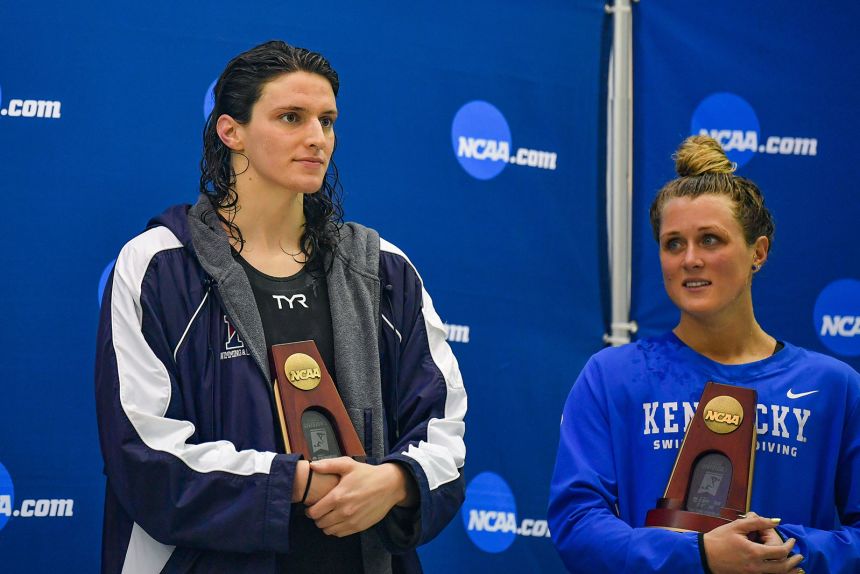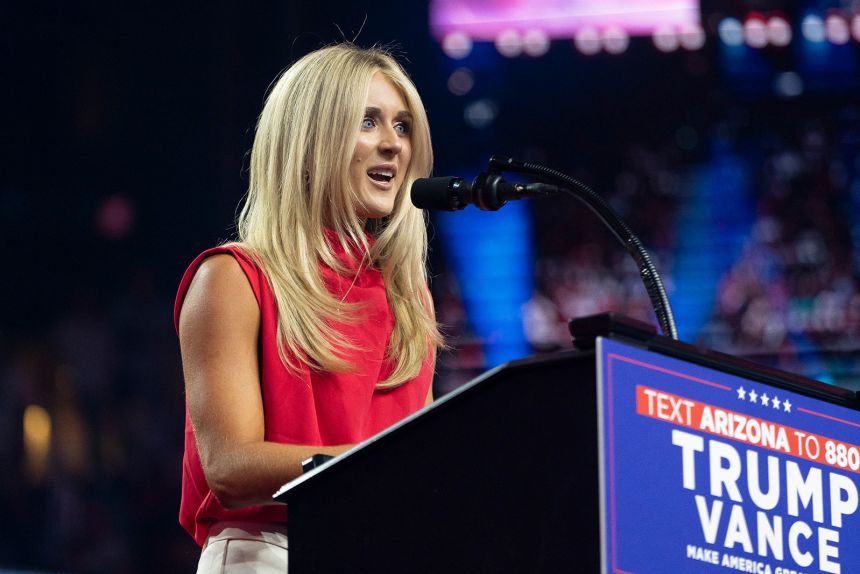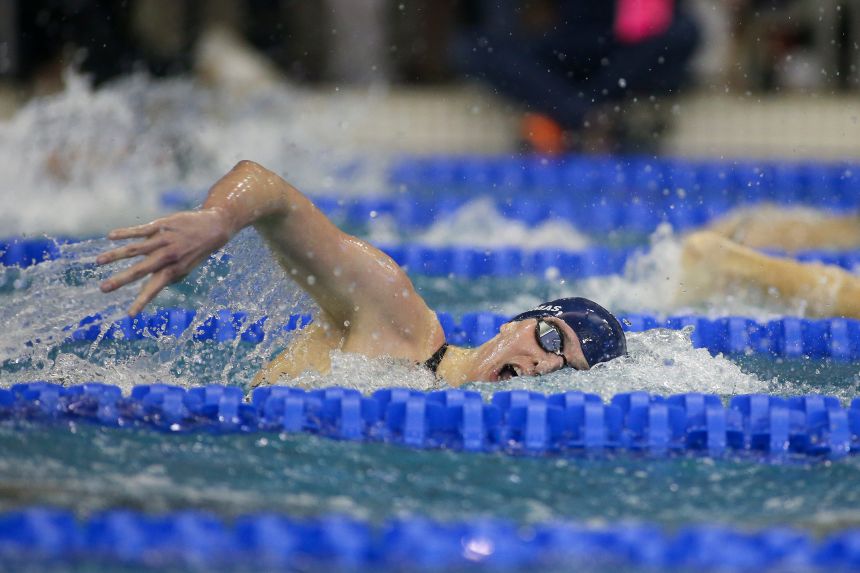In a few short years, Riley Gaines has channeled a fifth-place tie with Lia Thomas – the first transgender athlete to win an NCAA Division I title – into a career as a vocal, conservative activist at the forefront of a movement to bar trans women from competing in sports.
Gaines’ efforts reached a peak this week, when the University of Pennsylvania acceded to the Trump administration’s demands to receive federal funding by erasing all of Thomas’ records and prohibiting future trans athletes from playing in female sports.
The administration also required the university to issue personal letters of apology to each female swimmer it says were impacted by the school’s decision to allow Thomas to compete – including Gaines.
She shared her reaction to the news on social media.
“I have been relentless in this pursuit for the past three years, so to say I feel vindicated and again grateful for the leaders holding these people accountable, is an understatement,” Gaines said. “I will be waiting for my apology from the University of Pennsylvania.”
CNN has reached out to Gaines for comment.
Gaines has previously said she is campaigning against what she calls “gender ideology” and she views her work as defending the rights of women and girls to compete fairly in sports. But trans-rights advocates tell CNN her crusade has come at the expense of vilifying an incredibly small minority of students and athletes who may now no longer be able to compete in a team sport and achieve their dreams.
And it all began with a disagreement over a trophy.

The tie that began a movement
As she made her final strokes in the 200-yard freestyle at the 2022 NCAA swimming championships, Gaines drew level with Thomas.
Just the day before, Thomas, who competed for UPenn, had become the first transgender athlete to win a Division I National Championship – in any sport – during the 500-yard freestyle event.
But as she dove from the starting block in the 200-yard event, Thomas lagged behind the other competitors.
When Gaines surfaced after completing the race, she would later say she was “surprised” to see both she and Thomas tied for fifth place when she checked the leaderboard.
“I kind of look at my teammates for reassurance like, ‘Did we really just tie?’” she recalled in a YouTube interview several months after the competition, adding that a draw is “fairly rare” in competitive swimming.
But as NCAA officials distributed awards backstage, Gaines said she became frustrated – then angry – when officials asked her to pose for photos holding the sixth-place trophy, while Thomas held the fifth, because they didn’t have two prizes for the tie.
Her trophy, she said she was told, would come later in the mail.
For Gaines, the decision to allow Thomas to hold the prize that day exemplified how trans athletes “were given a preferential treatment over females.”
“That’s when it hit me that no one else is going to speak out about this,” she said. “I’m not someone who’s scared.”
Channeling her anger into action
At the core of disagreements over transgender access to sports is whether trans women have an unfair physical athletic advantage over athletes assigned female at birth. Research on trans athletes’ performance is scarce and no large-scale scientific studies have been conducted on it or on how hormone therapies may affect their performance in specific sports.
Even in the 2022 NCAA competition that launched Gaines’ anti-trans advocacy, both she and Thomas were bested by four other women – including two-time Olympic medalist Taylor Ruck, who won the 200-yard race – to tie for fifth place.
In fact, Gaines is campaigning against a situation that, even by the NCAA’s own estimates, is incredibly rare. Last year, NCAA President Charlie Baker told Congress he believed there were fewer than 10 known trans student athletes out of 500,000 who play collegiate sports.
Still, Gaines, as well as conservative lawmakers and other anti-trans activists, has used the specter of Thomas and transgender athletes to pursue a nationwide movement to ban them from competing in women’s sports.
A Pew Research Center study in 2022 found that while societal views on gender identity and discrimination are complex, the majority of people support laws protecting transgender individuals from discrimination.
However, 58% of people surveyed also favored policies that require transgender athletes to compete on teams based on the sex they were assigned at birth, rather than based on their gender identity.
At first, Gaines insisted she didn’t blame Thomas personally for competing – and winning – in a sport that aligned with her gender identity.
“I am in full support of her and full support of her transition and her swimming career and everything like that,” she told the conservative outlet, The Daily Wire, in 2022, “because there’s no doubt that she works hard too, but she’s just abiding by the rules that the NCAA put in place, and that’s the issue.”
But as her platform and prominence grew over the years, Gaines’ views appear to have shifted and she began espousing harsher, anti-trans rhetoric both on her podcast, “Gaines for Girls,” and in appearances with prominent Republican lawmakers – and her work has had a wide-ranging impact.

The announcement that the University of Pennsylvania would change its policies to bar future trans athletes came on the same day the eponymous “Riley Gaines Act” – a Georgia law that also blocks transgender women and girls from competing in women’s sports – went into effect.
Gaines celebrated in April after Republican Georgia Gov. Brian Kemp signed the bill into law, saying it would “protect” women. In a statement shared by the Lt. Governor’s office, Gaines appeared to intentionally misgender Thomas saying she was “forced to compete against a man” during the 2022 NCAA swimming championship, which was held in Atlanta.
“It’s an honor of a lifetime to know our stories help shed light on a grave problem of rampant gender ideology that means women are victims of government facilitated sex discrimination,” Gaines said.
Republican Georgia Lt. Gov. Burt Jones praised Gaines and other female athletes for their role in shaping the legislation, saying, “we couldn’t have done it without their courage and support.”
The LGBTQ advocacy group GLAAD has warned the law could be weaponized against cisgender students accused of being transgender, while also pointing out that it fails to address the real challenges women face in sports, such as inequitable facilities, pay disparities, and sexist harassment.
Trans inclusion in collegiate sports
For more than a decade, the NCAA had a policy based on the recommendations of the International Olympic Committee that allowed trans student athletes to compete, provided their hormone levels met certain criteria.
Then, in 2024, Gaines became the named plaintiff in a lawsuit against the NCAA, alleging the sporting body had violated women athletes’ Title IX rights by allowing athletes like Thomas to compete.
“Let me be perfectly clear: a school that knowingly allows a male athlete to take a spot on a women’s team, or allows a male athlete to take the field in a woman’s game, is denying a female student an athletic opportunity. That is sex discrimination,” Gaines said in her testimony before a House subcommittee in 2023. “Americans know intuitively that this is not fair.”
Transgender individuals have stressed – beyond winning awards – there are mental health benefits of being able to play a team sport and compete on a team that aligns with their gender identity.
Medical experts say gender is distinct from the biological sex one is assigned at birth. Trans people argue creating laws that say there are only two genders denies and dismisses their lived experiences.
Medical experts also note that the higher rates of poor health outcomes, including anxiety, depression, and suicidality, among transgender individuals are influenced by multiple factors, with bias and discrimination being significant contributors. Systemic issues such as stigma and attacks on civil rights further intensify these mental health challenges.
In February, Trump signed an executive order banning trans women from competing in most women’s sports. Before signing the order, Trump praised Gaines, who stood behind him at the podium. After noting how she spent “countless hours” training to compete for the title, Trump called the draw with Thomas “stolen glory.”
“It was a very unfair situation … it was ridiculous, frankly, but I want to thank Riley. She really has been in the forefront,” he said.
In response to the order, the NCAA updated its policy to restrict participation to athletes assigned female at birth.
Gaines celebrated the NCAA’s announcement by sharing a photo of the podium ceremony where she tied with Thomas on social media, writing, “I wish I could’ve told the girl in this photo what was to come in 2025.”
“It was true then and it’s true now,” Gaines wrote, before again misgendering Thomas. “He’s a man.”
Leveraging Thomas’ ‘dignity and her legacy’
Trans rights activist Charlotte Clymer said she takes no pleasure in being prescient about the ascendency of the movement to bar trans women from sports. Clymer told CNN she began warning advocates and lawmakers that this day would come years ago, but she was often brushed off, until it was too late.
“I think UPenn was fine with Lia Thomas competing during the years that she was on their swim team, and now that they need some kind of quick solution to save their funding, they decided that offering Lia Thomas as a sacrifice is a valid option,” Clymer said.
“They have decided to leverage her dignity and her legacy as a groundbreaking athlete – and her safety for that matter – to save themselves.”
Clymer said she’s always advocated for fairness in sports, but the NCAA had rules in place for nearly a decade that balanced fairness, nuance and trans athletes’ ability to compete.
It’s only now, she said, that political winds have shifted to the right, that sporting bodies seem willing to abandon those positions at the expense of the rights of trans students.

For her part, Thomas rarely speaks publicly and has instead chosen to fight for her right to play out in the courts. She did not immediately respond to CNN’s request for comment.
Last year, Thomas’ hopes of competing in Paris Summer Olympics were dashed when a panel of judges ruled she lacked standing.
The Trump administration’s Department of Education has made targeting Thomas and trans athletes like her a central part of its efforts to root out diversity, equity and inclusion in schools.
Gaines has since capitalized on her opinions by turning them into a career as a conservative commentator. She’s the host of a podcast, and the author of an autobiography titled, “Swimming Against the Current: Fighting for Common Sense in Women’s Sports.”
In February, Gaines was featured in an ad produced by XX-XY Athletics – a clothing brand that uses its proceeds to “protect women’s sports and spaces” by fighting to stop “males stealing trophies.”
The ad was later shared by vocal anti-trans activist and author J.K. Rowling.
“I love it,” she wrote.




